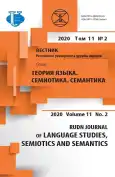Film Naming: Book Titles and Film Titles
- 作者: Krasina E.A.1, Rybinok E.S.1, Moctar A.1
-
隶属关系:
- Peoples’ Friendship University of Russia (RUDN University)
- 期: 卷 11, 编号 2 (2020): Semantics of Universal and Specific in the Language and a Text
- 页面: 330-340
- 栏目: SEMIOTICS OF TEXT AND DISCOURSE
- URL: https://journal-vniispk.ru/2313-2299/article/view/323284
- DOI: https://doi.org/10.22363/2313-2299-2020-11-2-330-340
- ID: 323284
如何引用文章
全文:
详细
The studies of a film text as a polycoded textual phenomena involve the studies of its integral components, such as film story and screenplay, reflecting storyline or plot of a literary text that serves as a precedential text to filming and as an immediate constituent of a film itself. Film title combines the features of a book or story title and functions as a precedential phenomenon as well, but is an integral part of the process of film promotion and release, and in cinematographic sphere it’s of crucial importance. In fact, the original book or story titles used to change especially with time and audience involved, when filming remaking changes to TV series and miniseries, or films are followed by sequels and prequels so that not to make something like Jaws 3 or Indiana Jones 5 . Anyhow, most of film titles fully repeat or at least conserve the title of a literary text, still it’s often amplified to make difference or to emphasize the idea that the screenplay is a new one just the story to be continued, e.g., Jaws-3D: The Revenge. Not very often the changes are marked graphically as of Romeo + Juliet or Romeo & Julie t, so that to hint a new turnoff the plot to the audience. It’s obvious that film titles often use names of main characters either for series or episode titles or to form a film franchise like that of Jurassic Park or Indiana Jones ones. As people started to use different IT gadgets they used to read books less and less, and film stories tend to make a new book form when a book is no longer a precedent to a film. Thus the cycle of “book title → film title” was completed by a part of “film title → book title (or book itself” to reflect the reverse trend, which is known worldwide.
作者简介
Elena Krasina
Peoples’ Friendship University of Russia (RUDN University)
编辑信件的主要联系方式.
Email: krasina-ea@rudn.ru
Doctor in Philology, Professor, Professor of the General and Russian Linguistics Department, Philological Faculty
6, Miklukho-Maklaya street, Moscow, 117198, Russian FederationEugeniy Rybinok
Peoples’ Friendship University of Russia (RUDN University)
Email: e.rybinok@yandex.ru
Chief Administrator of the Philological Study n.a. L.A. Novikov & N.M. Firsova; a PhD degree-seeking student of the General and Russian Linguistics Department, Philological Faculty
6, Miklukho-Maklaya street, Moscow, 117198, Russian FederationAlia Moctar
Peoples’ Friendship University of Russia (RUDN University)
Email: moctar.alia@hotmail.com
PhD student of the General and Russian Linguistics Department, Philological Faculty
6, Miklukho-Maklaya street, Moscow, 117198, Russian Federation参考
- Novikova, M.L. (2020). Ontology of the art of poetry and exclusion: a monograph. Moscow: Publishing house Econ-Inform. (In Russ.).
- Karaulov, Yu.N. (2010). Russian language and language personality. Moscow: LCI. (In Russ.).
- Gudkov, D.B. (2000). Precedent situation and methods of its implementation In Language, consciousness, communication. Moscow: Dialog-MSU. Issue 11. pp. 40—46. (In Russ.).
- Vysotskaya, I.V. (2013). The controversial questions of the theory of precedent. Critique and Semiotics, 1 (18), 117—132. URL: http://www.philology.nsc.ru/journals/kis/pdf/CS_18/ cs018vysotskaya.pdf (accessed: 11.01.2020). (In Russ.).
- Slyshkin, G.G. & Efremova, M.E. (2002). Kinotext (experience of linguocultural analysis): monograph. Moscow: Aquarius Publishers. (In Russ.).
- Lotman, Yu.M. (1973). Semiotics of cinema and problems of cinema aesthetics. Tallinn: Eesti Raamat. (In Russ.).
- Maksimenko, O.I. (2016). Bells letters adaptation: from novel to comics. Bulletin of the MSRU. Series: Linguistics, 2, 111—116. (In Russ.).
- Alexandrova O.I., Krasina E.A. & Rybinok E.S. (2019). Precedent phenomena of a film text: feature film title in the terms of translation. Philological Sciences. Scientific Essays of Higher Education, 5, 22—33. doi: 10.20339/PhS.5-19.022. (In Russ.).
- Aleksandrova, O.I. (2018). Foreign Film Title: Translation or a New Naming Unit? In Naming in Different Areas of Communication Field: Collective monograph. Ottawa: Carleton University. pp. 107—136.
- Menand, L. “What Do We Love About ‘War and Peace’?”: via www.newyorker.com. (accessed: 24.02.2020).
- Briggs, A. (2005). “Introduction” to “War and Peace”. Penguin Classics.
- Pevear, R. (2008). “Introduction” In War and Peace, L. Volokhonsky (Transl.). New York: Vintage Books.
- Nabokov, V. (1980). Lectures on Russian Literature. New York: Harvest.
- Kinopoisk. URL: https://www.kinopoisk.ru/film/8385/ (accessed: 16.01.2020).
- Dixon, Wheeler W. (2000). Film genre 2000: new critical essays In The SUNY series, cultural studies in cinema/video. New York: SUNY Press.
- Gambino, M. (2018). “What is The Godfather Effect?”. Smithsonian. Archived from the original on September 10, 2018. URL: https://www.smithsonianmag.com/arts-culture/what-isthe-godfather-effect-83473971/ (accessed: 21.02.2020).
- Connor, J.D. (2015). The Studios after the Studios: Neoclassical Hollywood (1970—2010). LA: Stanford University Press.
- Binet, L. (2015). La Septième Fonction du langage. Paris: Edition Grasset & Fasquelle. (In French).
补充文件









